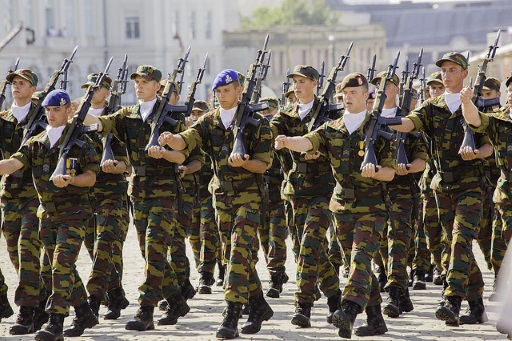
Optimism and rearmament

In
At the start of the new year, Sven Biscop desperately tries to remain optimistic.
This article also appeared in a Dutch version in De Morgen on 27 December 2016.
*****
Optimism and rearmament
Come 20 January, Europe’s main ally will be Donald Trump. On that day he will take the oath as President of the United States. The elephant (the symbol of the Republican Party) is taking over the porcelain shop. Of everything that is happening around us, I find this the most worrying of all.
And I am worried. For the first time in my career I find it difficult to be optimistic about world politics in the new year. In recent months I have noticed that when speaking for my students and for all kinds of civil society groups, the tone always ends up more sombre than I envisaged. And that in spite of the humour I try to insert. (Which has its own hazards: I don’t remember what you were on about, but I do know you were funny, someone who had heard me – not a student – once told me).
Perhaps it is age or, better, experience. I graduated from Ghent University in 1998 on a thesis on European defence. Ever since, I have been basically writing the same article, year after year. Not only to pad the academic CV (as professors are officially expected to be prolific, and to teach, and to be in the newspapers, and, most importantly, to sit on innumerable committees). But, alas, also because things simply do not advance. To this day, there is no real European defence, nor a truly European strategy.
Yes, we have heard many grand declarations about European defence these last months, including from the key actors: France and Germany. But it almost seems as if the policy-makers involved would prefer to do my job: they like to write about it, they like to talk about it – but they don’t do it.
This is why I really worry: because of Europe itself. There is little ground to trust that Europe will resolutely and unitedly face all of the challenges around us. Not because we cannot, even though the obstacles are great and numerous (from time-wasting Brexit negotiations to French and German elections that might turn awry). But because we will not. Deep down, most national leaders remain wedded to national solutions. And they still believe that, eventually, everything will be alright, so no action needs to be taken. That is comfortable, of course, but history should teach us that what is the most comfortable is not necessarily the most strategic.
A most comfortable decision from the not too distant past was the Ten Year Rule. In 1919 the United Kingdom decided that it would not have to fight a major war in the next ten years, hence a limited defence budget would suffice. Every next year that ten-year horizon was automatically pushed back an additional year, quite regardless of what was actually going on in the world. Consequently, defence expenditure kept dropping and Britain de facto disarmed itself. Until the British finally realised, in the mid-1930s only, that a major threat in the next ten years had become extremely probable, and started rearming – luckily for Europe.
Today however Europe appears to be dazed by a Ten Year Rule of its own. A logical decision after the end of the Cold War to lower defence budgets has become (in Western Europe especially) blind faith in the eternal stability of our environment. The result: think the US out of NATO, and what is left strongly resembles the Belgian armed forces of 1940. A lot of people, limited modern equipment, and no leadership. A World War One army cannot win World War Two. It seems we have forgotten that.
Since we all know what Putin is likely to continue to do, and nobody knows what Trump is going to do, is it not time for Europe to get a hold on itself? To, dare I say it, rearm itself? I know, one is supposed to think positively at the start of the new year. The statement sounds so dramatical that I begin to doubt it again myself. But I cannot believe in miracles, only in reason. And reason tells me that if Europe wants to be secure, it will have to secure itself.
The 28 EU Member States do not need to continue to pay one and half million people (!) to wear uniform. What we need is a lot more real capacity: fewer but younger, better educated and better trained people, with the best equipment. At the same time, States should urgently scrap all the useless equipment that they maintain in their arsenals. (There are air forces in Europe, for example, that cannot operate outside national airspace). Most importantly: this will only be affordable, and it can only work, if we really integrate our defence efforts.
I will gladly continue to pontificate about European defence. But could our political leaders please just do it now? Then I can be my optimist self again.
Prof. Dr. Sven Biscop is the Director of the Europe in the World Programme at the Egmont – Royal Institute for International Relations in Brussels and a Professor at Ghent University. He is an Honorary Fellow of the European Security and Defence College.
(Photo credit: Antonio Conte, Flickr)